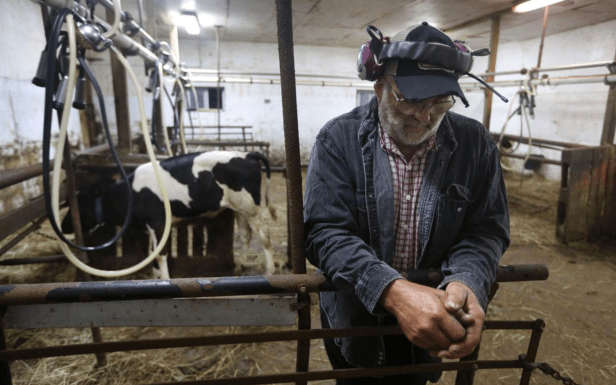Concerns rise over tainted sewage sludge spread on croplands
By John Flesher & Michael Casey | Associated Press | September 12, 2019

Read full article by John Flesher and Michael Casey (Associated Press)
“LAPEER, Mich. (AP) — For more than 20 years, the eastern Michigan town of Lapeer sent leftover sludge from its sewage treatment plant to area farms, supplying them with high-quality, free fertilizer while avoiding the expense of disposal elsewhere.
But state inspectors ordered a halt to the practice in 2017 after learning the material was laced with one of the potentially harmful chemicals known collectively as PFAS, which are turning up in drinking water and some foods across the U.S.
Now, the city of 8,800 expects to pay about $3 million to have the waste treated at another facility and the leftover solids shipped to a landfill. Testing has found elevated PFAS levels in just one field where the sludge was spread, but farmers have lost an economical fertilizer source and hope more contamination doesn’t turn up…
Lapeer isn’t alone. For decades, sewage sludge from thousands of wastewater treatment plants has been used nationwide as cropland fertilizer. It’s also applied to sports fields, golf courses and backyard gardens…
The city of Marinette, Wisconsin, has stopped distributing sewage waste, also called ‘biosolids,’ to farms after getting high PFAS readings. In Maine, a dairy farm was forced to shut down after sludge spread on the land was linked to high levels of PFAS in the milk.
‘It’s been devastating. We kind of get treated like we are criminals,’ said Stoneridge Farm’s Fred Stone, whose blood has also tested high for PFAS from what he believes was drinking contaminated water and milk over the years…
The extent of any threat to the food supply is unknown because so little testing has been done, scientists say.
‘We don’t have a lot of data but the data we have suggests it’s a problem,’ Linda Birnbaum, director of the National Institute of Environmental Health Sciences, said at a recent conference in Boston. ‘We are finding that there are elevated levels of different PFAS in biosolids. We clearly need more research in this area’…
Yet despite growing evidence that at least some sludge is contaminated, the federal government hasn’t limited PFAS in fertilizer or developed a standard for determining safe levels. That leaves fertilizer companies and farmers wondering what to do and fearful of consumer backlash.
‘If you want to destroy agriculture in Michigan, start talking about, “Hey, it could be contaminated with PFAS,'” said Laura Campbell, agricultural ecology manager for the Michigan Farm Bureau. ‘People will see that and say, “Oh, we can’t trust them, we’ll buy from elsewhere,” even though the problem is no worse in Michigan than it is anywhere else’…
An EPA ‘action plan’ in February acknowledged ‘information gaps’ about tainted sludge. It said the agency was developing better detection methods and assessing risks posed by PFOA and PFOS, which no longer are manufactured in the U.S. but remain widespread in the environment.
‘We are studying the potential pathways by which PFAS are getting into biosolids and we are researching alternative methods for removing or destroying PFAS in biosolids if analysis indicates that detected levels are of risk and need reduction,’ the agency told The Associated Press in a statement…
Several states are examining sewage sludge for PFAS contamination and assessing potential dangers. Maine has enacted a nonbinding advisory level for PFAS in sludge and New Hampshire is working with the U.S. Geological Survey on a soil study whose results will help them set a standard…
Based on sludge tests at 41 plants, Michigan ordered several to stop distributing it to farms.
After the state’s environmental department ordered some plants to trace PFAS sent to them, several installed treatment systems that sharply reduced their pollution output, spokesman Scott Dean said…
Although they complain about a lack of government standards, some cities and towns fear strict rules that could force costly infrastructure upgrades or sending sludge to out-of-state landfills. And companies worry they will be put out of business.
‘This is the biggest issue that has hit the biosolids recycling profession in North America ever, because of regulatory overreaction,’ said Ned Beecher, executive director of the North East Biosolids and Residuals Association.
Companies that manufacture compost — some from sewage sludge — contend tough standards are premature until scientists determine acceptable PFAS levels.
‘We don’t want people jumping to conclusions,’ said Frank Franciosi, executive director of the U.S. Composting Council. If EPA cracks down on anyone, he said, it should be those who manufacture and use PFAS chemicals that enter the waste stream.”
This content provided by the PFAS Project.
Location:
Topics: